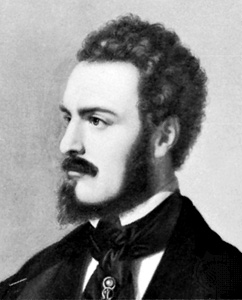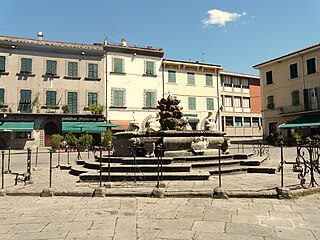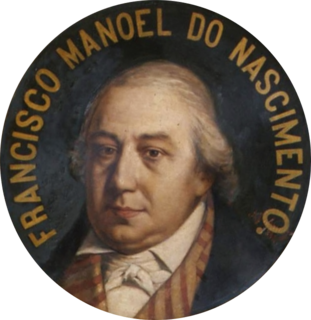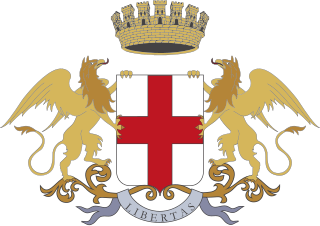

Giovanni Fantoni (1755—1807) was an Italian poet. [1]


Giovanni Fantoni (1755—1807) was an Italian poet. [1]
Third son of Count Lodovico Antonio Fantoni and the Marquise Anna De Silva della Banditella, and therefore excluded from the hereditary axis in compliance with the law of the majorasco, he was initiated into ecclesiastical life and educated in the Benedictine monastery in Subiaco and, three years later, in the Nazarene College of Piarists in Rome; but his character intolerant of discipline and his anti-clerical spirit were not compatible with monastic life. In 1772 Giovanni left the college and obtained a post as an apprentice at the secretariat of state in Florence but was unable to achieve satisfactory results. His father therefore decided to initiate him into a military career by sending him first among the cadets in Livorno and then in 1775 following his uncle Andrea De Silva in Turin who enrolled him in the Royal Academy and managed to get him a position as an infantry lieutenant. In this same period, his old tutor informed him of his admission to the Academy of Arcadia with the name of Labindo Arsinoetico. In this same period, his old tutor informed him of his admission to the Academy of Arcadia with the name of Labindo Arsinoetico. In the following years, however, Fantoni's nature proved unsuitable even for this career and, after resigning, he even ended up risking arrest for debt.
During 1779, on his pilgrimage home, he stopped in Genoa and continued to lead a worldly life, again contracting numerous debts and dedicating himself to numerous female acquaintances, above all the marquise Maria Doria Spinola. From this Genoese period there is even a report on the poet sent by an anonymous person to the Ligurian government: «This one is very young and seductive in manners, so he is idolized by his young contemporaries, and also by the most refined ladies, with whom he uses unusual caresses among us and condemned by the virtuous.
Perhaps the most significant period of Giovanni Fantoni's political experience is represented by the Republican Triennium when, between 1796 and 1799, the French occupation of the Peninsula led to the formation of the sister Republics. These new states became the main point of reference for the action of the Italian patriots, so much so that many of them went to the occupied territories to participate in the turmoil and political life of the regions; among these there was also Fantoni. As evidence of this, there are various events in which the Tuscan poet took part: the revolutionary uprisings, the siege of Montechiarugolo, the second Congress of the Cispadan Confederation, the defense of Genoa. However, Labindo's involvement was not limited only to direct participation in these events; at the same time, in fact, he also carried out some activities that perhaps most of all return a clear image of his commitment and his political vision. During the Reggio riots, he became the protagonist of propaganda actions to persuade citizens to establish a democratic government and a path of public education accessible to all. The importance attributed to education is also found in his attempt to bring young people closer to republican values when, in Modena, on 21 May 1797, he invited them to set up a symbolic Regiment of Hope in charge of defending the republic from any reactionary attempt.
Fantoni's commitment was also very strong in some intellectual circles and secret societies such as the Milanese constitutional circle and the Società dei Raggi. Through these channels he was able to participate in the political discussion and government of the new republican states, sometimes even practicing subversive conspiratorial activities towards the French government itself. The two arrests suffered by the Tuscan poet were precisely caused by dissent towards the transalpine government: the first following protests for the drafting of a more conservative constitution imposed by the French government on the Cisalpine republic, the second for opposition to the annexation of the Kingdom of Sardinia to France.

Giuseppe Mazzini was an Italian politician, journalist, and activist for the unification of Italy and spearhead of the Italian revolutionary movement. His efforts helped bring about the independent and unified Italy in place of the several separate states, many dominated by foreign powers, that existed until the 19th century. An Italian nationalist in the historical radical tradition and a proponent of social-democratic republicanism, Mazzini helped define the modern European movement for popular democracy in a republican state.

The House of Medici was an Italian banking family and political dynasty that first began to gather prominence under Cosimo de' Medici, in the Republic of Florence during the first half of the 15th century. The family originated in the Mugello region of Tuscany, and prospered gradually until it was able to fund the Medici Bank. This bank was the largest in Europe during the 15th century, and it facilitated the Medicis' rise to political power in Florence, although they officially remained citizens rather than monarchs until the 16th century.

The history of Italy covers the ancient period, the Middle Ages, and the modern era. Since classical antiquity, ancient Etruscans, various Italic peoples, Celts, Magna Graecia colonists, and other ancient peoples have inhabited the Italian Peninsula. In antiquity, Italy was the homeland of the Romans and the metropole of the Roman Empire's provinces. Rome was founded as a Kingdom in 753 BC and became a republic in 509 BC, when the Roman monarchy was overthrown in favor of a government of the Senate and the People. The Roman Republic then unified Italy at the expense of the Etruscans, Celts, and Greek colonists of the peninsula. Rome led Socii, a confederation of the Italic peoples, and later with the rise of Rome dominated Western Europe, Northern Africa, and the Near East.

Andrea Zanzotto was an Italian poet.

Giuseppe Giusti was an Italian poet and satirist.

Gian Gastone de' Medici was the seventh and last Medicean Grand Duke of Tuscany.

Fivizzano is a comune in the province of Massa and Carrara, Tuscany, central Italy.

Italian literature is written in the Italian language, particularly within Italy. It may also refer to literature written by Italians or in other languages spoken in Italy, often languages that are closely related to modern Italian, including regional varieties and vernacular dialects. Italian literature begins in the 12th century, when in different regions of the peninsula the Italian vernacular started to be used in a literary manner. The Ritmo laurenziano is the first extant document of Italian literature.

Simone Boccanegra was the first Doge of Genoa. He became doge in 1339, but was ousted from power six years later. He regained the position in 1356, retaining it until his death in 1363.

Inconfidência Mineira was an unsuccessful separatist movement in Brazil in 1789. It was the result of a confluence of external and internal causes in what was then colonial Brazil. The external inspiration was the independence of thirteen British colonies in North America following the American Revolutionary War, a development that impressed the intellectual elite of particularly the captaincy of Minas Gerais. The main internal cause of the conspiracy was the decline of gold mining in that captaincy. As gold became less plentiful, the region's gold miners faced increasing difficulties in fulfilling tax obligations to the crown. When the captaincy could not satisfy the royal demand for gold, it was burdened with an additional tax on gold, called derrama.

The Republic of Lucca was a medieval and early modern state that was centered on the Italian city of Lucca in Tuscany, which lasted from 1160 to 1805.

Francisco Manoel de Nascimento, Portuguese poet, better known by the literary name of Filinto Elísio, bestowed on him by the Marquise of Alorna, was the reputed son of a Lisbon boat-owner.

Carlo Alberto Rosselli was an Italian political leader, journalist, historian, philosopher and anti-fascist activist, first in Italy and then abroad. He developed a theory of reformist, non-Marxist socialism inspired by the British Labour movement that he described as "liberal socialism". Rosselli founded the anti-fascist militant movement Giustizia e Libertà. Rosselli personally took part in combat in the Spanish Civil War where he served on the Republican side.

The maritime republics, also called merchant republics, of the Mediterranean Basin were thalassocratic city-states in Italy during the Middle Ages. Since 1947, four of them have the coat of arms inserted in the flag of the Italian Navy: Venice, Genoa, Pisa and Amalfi; the other republics are: Ragusa, Gaeta, Ancona and the little Noli.

Giovanni di Bardo Corsi (1472–1547) was a politician and man-of-letters in Florence, Italy during the Italian Renaissance. He was a member of the committee that in 1512 restored the Medici to power in Florence after eighteen years of exile. He served as a diplomat to Charles V of Spain in 1515 and to Pope Paul III. In 1530, Corsi became Florentine gonfaloniere at the behest of Pope Clement VII, the Medici Pope.

Giano I di Campofregoso was the 31st Doge of the Republic of Genoa.

The French conquest of Corsica was a successful expedition by French forces of the Kingdom of France under Comte de Vaux, against Corsican forces under Pasquale Paoli of the Corsican Republic. The expedition was launched in May 1768, in the aftermath of the Seven Years' War. A French expeditionary force was landed on the island of Corsica, then ruled by the Corsican Republic. Marching inland to overcome any Corsican opposition, the French force initially suffered an unexpected defeat at the Battle of Borgo. But a new commander, the Comte de Vaux, was appointed to lead the expedition, and decisively defeated the Corsican army at the Battle of Ponte Novu in 1769, effectively bringing an end to Corsican resistance.

Giovanni Battista Doria was the 50th Doge of the Republic of Genoa.

Luca Spinola was the 129th Doge of the Republic of Genoa and king of Corsica.

Raffaele Agostino De Ferrari was the 180th Doge of the Republic of Genoa.